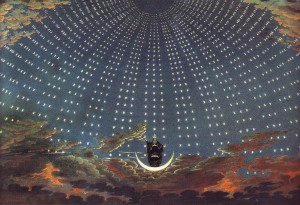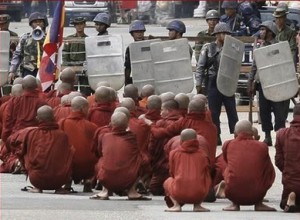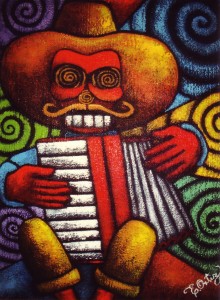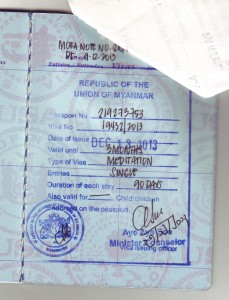Heavy
 Here’s another one of the poems Phillip Moffitt quoted at the day-long retreat I “attend” (by listening to tapes) on New Years Day.
Here’s another one of the poems Phillip Moffitt quoted at the day-long retreat I “attend” (by listening to tapes) on New Years Day.
Heavy by Mary Oliver
That time
I thought I could not
go any closer to grief
without dying
I went closer,
and I did not die.
Surely God
had his hand in this,
as well as friends.
Still, I was bent,
and my laughter,
as the poet said,
was nowhere to be found.
Then said my friend Daniel,
(brave even among lions),
“It’s not the weight you carry
but how you carry it —
books, bricks, grief —
it’s all in the way
you embrace it, balance it, carry it
when you cannot, and would not,
put it down.”
So I went practicing.
Have you noticed?
Have you heard
the laughter
that comes, now and again,
out of my startled mouth?
How I linger
to admire, admire, admire
the things of this world
that are kind, and maybe
also troubled —
roses in the wind,
the sea geese on the steep waves,
a love
to which there is no reply?
New Year, New Moon
 Yesterday was not only the first day of the New Year, it was also the first New Moon of the New Year…so in addition to my usual New/Full Moon Practice of keeping the 8 Precepts and extending my evening meditation till midnight, I added a little “selfie” retreat by listening to a set of 3 tapes from a day-long Phillip Moffitt led on the Awareness of Awareness at the Barre Center for Buddhist Studies in April. (You can find the tapes on Phillip’s website here.)
Yesterday was not only the first day of the New Year, it was also the first New Moon of the New Year…so in addition to my usual New/Full Moon Practice of keeping the 8 Precepts and extending my evening meditation till midnight, I added a little “selfie” retreat by listening to a set of 3 tapes from a day-long Phillip Moffitt led on the Awareness of Awareness at the Barre Center for Buddhist Studies in April. (You can find the tapes on Phillip’s website here.)
It was a wonderful way to start the New Year. In celebration of which I offer these lines from Four Quartets, by T.S. Eliot…lines that Phillip refers to again and again when he teaches:
At the still point of the turning world. Neither flesh nor fleshless;
Neither from nor towards; at the still point, there the dance is,
But neither arrest nor movement. And do not call it fixity,
Where past and future are gathered. Neither movement from nor towards,
Neither ascent nor decline. Except for the point, the still point,
There would be no dance, and there is only the dance.
I can only say, there we have been: but I cannot say where.
And I cannot say, how long, for that is to place it in time.
…
Time past and time future
Allow but a little consciousness.
To be conscious is not to be in time.
…
Desire itself is movement
Not in itself desirable;
Love is itself unmoving,
Only the cause and end of movement,
Timeless, and undesiring
Except in the aspect of time
Caught in the form of limitation
Between un-being and being.
Sudden in a shaft of sunlight
Even while the dust moves
There rises the hidden laughter
Of children in the foliage
Quick now, here, now, always–
Ridiculous the waste sad time
Stretching before and after.
(image: set design for the entrance of the Queen of the Night in Mozart’s The Magic Flute, by Karl Friedrich Thiele)
What We Carry With Us
 One of my Dharma Buddies sent me a great article, published in Tricycle, called The Long Road to Sitting Still: Why Should a Buddhist Travel? by Pico Iyer. (Thanks, Andrea!) Here’s a quote:
One of my Dharma Buddies sent me a great article, published in Tricycle, called The Long Road to Sitting Still: Why Should a Buddhist Travel? by Pico Iyer. (Thanks, Andrea!) Here’s a quote:
Christians and Muslims observe great and classic pilgrimages, and so do people set on their own course, but the Buddha, perhaps, taking the Middle Way and always reminding us that even our destination is unfixed and perhaps illusory, is every walker’s special friend. Those who journey with him know that they may not come to knowledge so much as a deepened sense of their own ignorance. Even after he arrived at the Bodhi tree, Siddhartha had to sit through night after night before finally waking up to the truth he’d been carrying with him every moment.
And then, of course, he took to the road again, for the next 45 years, across the plains and cities of the central Gangetic plain, if only to tell people to become lamps unto themselves. His very last words seem to suggest that the journey is perpetual: “All created things move one. Keep striving with diligence.”
“In one sense we are always traveling,” Thomas Merton wrote, “traveling as if we did not know where we are going. In another sense we have already arrived.” The lives of each of us, the Buddha was saying on his path, are a journey towards recognizing where we’ve been all along.
(image by Kate Pocrass, from En Route Notecards, published by Chronicle Books)
Celebrate!!!
And I’ve decided to celebrate by being kind…especially to my mother, who 63 years ago today, was having what I can only image as an extremely painful, exhausting, and probably frightening day. But joyous, too, I am told.
Thanks, Mom, for giving me the most precious gift of all–this human life.
I vow to use it well.
The Trouser People
 Now I’ve started reading The Trouser People: Burma in the Shadows of the Empire, by Andrew Marshall, and I can’t put it down.
Now I’ve started reading The Trouser People: Burma in the Shadows of the Empire, by Andrew Marshall, and I can’t put it down.
Here’s how it starts:
Philip the Miracle Monk rummaged at length in the mysterious folds of his orange robes and retrieved a trilling mobile phone.
‘Excuse me for a second,’ he apologized, but I was getting used to it. Philip’s robes had been ringing all morning.
Hairless, podgy and swaddled in robes, Philip reminded me at times of a very large, very bright baby. I had met him in Chiang Mai, in northern Thailand, soon after dawn, and it was immediately obvious that he was a highly unusual monk. For a start, most monks were not fanatical fans of the heavy-metal group The Scorpions–at least not as far as I knew. Monks weren’t usually called Philip either. His Buddhist holy name was as long as his arm, and was a bit of a mouthful for foreigners, so he had chosen an English name inspired by an electrical appliance.
‘I liked the sound of it,’ he told me. ‘It sounded very modern.’
Nor are monks supposed to know as much about troup movements as Philip seemed to: the Shan State Army, he whispered, had just dispatched 2,000 fighters to positions in north-east Burma. Not long ago, it was rumored, Philip had returned from Thailand’s frontier with Cambodia, where he had negotiated the release of a clandestine arms shipment from some overzealous border police. His heavenly powers of persuasion in such dealings had earned him the nickname ‘Miracle Monk’. Sometimes he was also called the Combat Buddha. Later on, in the jungle, I spotted him sitting with sculpted calm, his robes wrapped tightly around him, reading “Guns & Ammo” magazine.
From the Land of Green Ghosts
 I have just finished another of the wonderful books my teacher, Lila, recommended I read in preparation for going to Burma. (Reading list here.) This one, non-fiction, is called From the Land of Green Ghosts, in which the author–Pascal Khoo Thwe, a member of a tiny, remote tribe in the hills of Burma famous for their “giraffe-necked women”–recounts a chance meeting with a Cambridge don and the correspondence the two strike up, leading to Pascal’s rescue from the jungles where he has had to flee after opposing the corrupt military dictatorship and his subsequent admission to Cambridge where he receives a degree in English Literature!
I have just finished another of the wonderful books my teacher, Lila, recommended I read in preparation for going to Burma. (Reading list here.) This one, non-fiction, is called From the Land of Green Ghosts, in which the author–Pascal Khoo Thwe, a member of a tiny, remote tribe in the hills of Burma famous for their “giraffe-necked women”–recounts a chance meeting with a Cambridge don and the correspondence the two strike up, leading to Pascal’s rescue from the jungles where he has had to flee after opposing the corrupt military dictatorship and his subsequent admission to Cambridge where he receives a degree in English Literature!
Whew.
And on top of all that, the writing is gorgeous!
Here’s how the story begins:
‘My ancestors told me it was after the beginning,’ said my grandmother, Mu Tha, adjusting her head on the log she was using as a pillow. Her brass neck-rings gleamed in the candlelight. The rings were fourteen inches high and rose to her head as though they were supporting a pagoda stupa. Hanging from her ears and neck were several silver chains holding coins and charms. The holes in her earlobes were big enough to put a bottle cork in. We sat at her feet massaging her legs and shoulder as we listened to her story.
‘The male and female winds were blowing through space, but the female wind was pregnant and could not keep up with the male. The male wind circled her until she gave birth to a golden egg, from which emerged the goddess of creation with her children. Sitting on the empty shell of the egg, the goddess watched the faraway stars coming into existence. They appeared in the deep blue-black sky like tiny but brilliantly luminous red, white and yellow flowers, their petals falling to the ground in a gale, filling the firmament.’
May Your Holidays Be Sweet & Salty
 I don’t spend all my time listening to Dharma talks. Yesterday I whipped up little Spiced Salt. Just the thing to kick up Christmas Sweet Potato Fries:
I don’t spend all my time listening to Dharma talks. Yesterday I whipped up little Spiced Salt. Just the thing to kick up Christmas Sweet Potato Fries:
1 tsp Kosher salt
1/2 tsp sugar
1/4 tsp ground cinnamon
1/4 tsp ground cumin
1/4 tsp ground coriander
1/4 tsp paprika
(from Fast, Fresh & Green, by Susie Middleton)
That Monkey Brain Needs Love
Over the weekend, I listened to a wonderful series of talks by Rick Hanson called No-Self in the Brain, given at a recent day-long event at Spirit Rock. Rick is a neuropsychologist and a New York Times best-selling author, who wrote Buddha’s Brain, and now has a new book out called Hardwiring for Happiness: The New Brain Science of Contentment, Calm and Confidence.
 He talks about how we have evolved with different “layers” in our brain. The first — and most primitive — is what he calls the “Lizard Brain,” which is primarily concerned with being safe. This is the nervous, will-I-be-OK? part of the brain.
He talks about how we have evolved with different “layers” in our brain. The first — and most primitive — is what he calls the “Lizard Brain,” which is primarily concerned with being safe. This is the nervous, will-I-be-OK? part of the brain.
The next is the “Mouse Brain,” which is primarily concerned with finding and getting nourishment. This is the hungry, will-there-be-enough? part of the brain.
And the last is the “Monkey Brain,” which is primarily concerned with establishing and maintaining social connections. This is the needy, am-I-loved? part of the brain.
We all have each of these, of course, but many of us have one that tends to be more easily triggered. In the talks (and I assume, in his book), Rick offers ways — in mediation — that we can relax and soothe these different parts of the brain.
The “Lizard Brain” can be soothed by noticing–and then staying with–those time when we feel a sense of safety and confidence.
The “Mouse Brain” can be soothed by noticing/staying with those time when we feel a sense of sufficiency and contentment.
And the “Monkey Brain,” (which seems to be my personal favorite) can be soothed by noticing/staying with those time we we feel a sense of loving and being loved.
How Strange
 I’ve been thinking a lot about death….but not in a bad way! It’s just that there seem to be lots of opportunities for me to think about it lately: my sister-in-law is attending her mother’s funeral today; my dharma buddy’s father-in-law died unexpectedly over Thanksgiving; and one of my teachers is at the bedside of her father “from which he will not rise again.”
I’ve been thinking a lot about death….but not in a bad way! It’s just that there seem to be lots of opportunities for me to think about it lately: my sister-in-law is attending her mother’s funeral today; my dharma buddy’s father-in-law died unexpectedly over Thanksgiving; and one of my teachers is at the bedside of her father “from which he will not rise again.”
Last night I had the chance to see a photo of someone who is very near death–he was extremely thin, so that I could see every bone in his chest–and I thought: how strange it is to be alive in these tender, miraculous, impermanent bodies that are so clearly beyond our control.
(image: Music from My Town, by Elizabeth Ortiz
It’s Here!
 The Fed-Ex envelope with my passport AND MY MEDITATION VISA has just arrived! I had expected it yesterday (while secretly hoping that it would get here the day before) and when it didn’t appear this morning, and then not by noon, I admit, I was starting to get worried. I figured I’d call the Embassy tomorrow morning, if nothing showed up by the end of the day.
The Fed-Ex envelope with my passport AND MY MEDITATION VISA has just arrived! I had expected it yesterday (while secretly hoping that it would get here the day before) and when it didn’t appear this morning, and then not by noon, I admit, I was starting to get worried. I figured I’d call the Embassy tomorrow morning, if nothing showed up by the end of the day.
And then I heard a little something while I was in the kitchen….which sounded a lot like a squirrel scampering across the front porch…but I thought, well maybe…so I opened the front door…and there it was!!!!
The envelope.
With my passport.
AND MY MEDITATION VISA!!!!!
(That big white triangle in the corner is a copy of my application form, also signed in an official-looking manner, which has been stapled to the page.)
I’m good to go!

